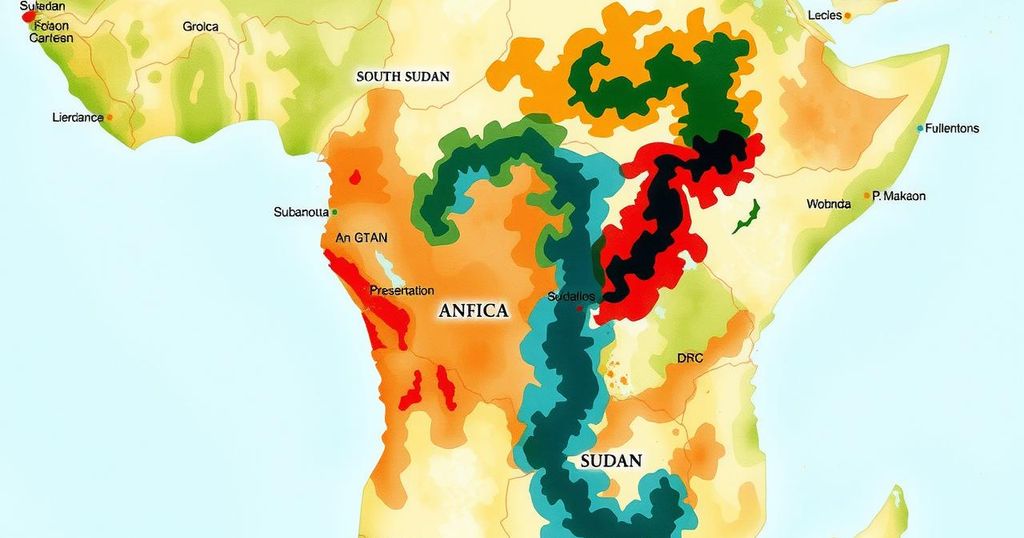Cholera Death Toll in Africa Surpasses 2,400: South Sudan and DRC Most Affected

Cholera outbreaks in Africa have led to over 2,400 deaths in 2025, primarily in South Sudan, DRC, Angola, and Sudan. The Africa CDC emphasizes the need for a coordinated response and highlights that lack of access to clean water is a major issue. Collaborative strategies from previous health responses, like that to mpox, are being adapted for cholera. Public health experts stress that improving sanitation is essential.
The Africa Centres for Disease Control and Prevention (Africa CDC) has reported an alarming rise in cholera cases in Africa, with the death toll exceeding 2,400 in just the first half of 2025. As of mid-May, the continent had recorded a staggering 115,513 cholera infections, with South Sudan, the Democratic Republic of Congo (DRC), Angola, and Sudan experiencing the brunt of this ongoing crisis.
Among these nations, South Sudan has been particularly hard-hit, with 848 fatalities attributed to cholera. Angola and the DRC follow closely behind, with reported deaths of 609 and 513, respectively. During an online media briefing, Yap Boum II, deputy incident manager for mpox at the Africa CDC, characterized the cholera outbreaks in these regions as “severe,” underscoring the urgency of the situation. Approximately 84% of all cholera cases and 92% of the year’s deaths have stemmed from these four nations alone.
Boum pointed to the root causes driving the choleral epidemic, primarily the severe lack of access to clean and safe drinking water. This public health threat is compounded by overstretched health systems, which struggle to address not only cholera but also several other disease outbreaks that Africa is currently facing. “A coordinated regional and continental response is urgently needed to control the spread of cholera outbreaks across Africa,” he emphasized.
In light of ongoing discussions about response strategies, the Africa CDC is looking to replicate the successes gained in the fight against mpox. Dr. Ngashi Ngongo, the Principal Advisor to the Africa CDC Director General, confirmed that the strategies that have worked well for mpox will now be adapted for cholera. He noted that collaboration with various partners is crucial and should help reshape the approach to managing cholera.
UNICEF has revealed concerning statistics indicating that more than 178,000 cholera cases and over 1,600 deaths have been confirmed across 16 eastern and southern African nations from January 2024 to March 2025. Countries including Kenya, Ghana, and Zimbabwe have all been affected, although South Sudan, Angola, DRC, and Sudan account for over 90% of the cases. Conflict remains a significant contributing factor to the spread of the disease in these regions.
The Africa CDC is now establishing an Incident Management Support Team (IMST), which involves a broad coalition of partners such as the World Health Organisation (WHO), UNICEF, and the International Committee of the Red Cross. This initiative aims to bolster the response mechanisms for ongoing and emerging public health threats, including cholera.
Under the leadership of Ngongo, the IMST has been recognized for its ability to effectively manage complex disease outbreaks through an integrated approach. This strategy encompasses not only cholera but also broader health issues like measles and chickenpox, aiming for a holistic response to interconnected public health challenges.
Despite the initiatives in place, public health experts warn that to truly combat cholera, improvements in water quality, sanitation, and hygiene are essential. They state that without addressing these fundamental issues, progress will be hampered. In addition, Ngongo called for a stronger African mechanism for pooled procurement of cholera vaccines, which have seen limited availability in recent years.
As the situation unfolds, the focus remains on ensuring effective coordination across health sectors to stem the tide of this ongoing cholera crisis while striving for a long-term resolution.
In conclusion, Africa is grappling with a severe cholera crisis, with deaths surpassing 2,400 across several countries, especially South Sudan, DRC, Angola, and Sudan. The Africa CDC highlights the urgent need for a coordinated response and stronger partnerships to fight this outbreak. While immediate measures are being implemented, the call for improvements in water access and sanitation remains critical to prevent future outbreaks and ensure sustainable health solutions.
Original Source: eastleighvoice.co.ke








